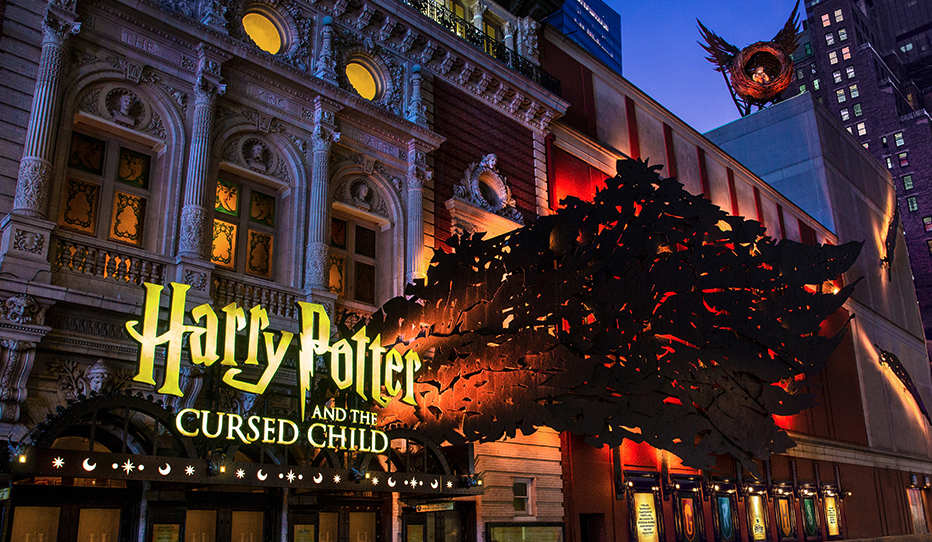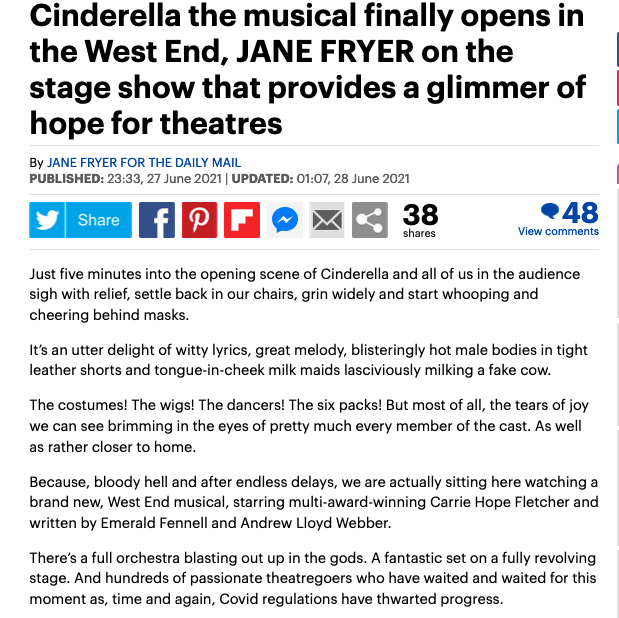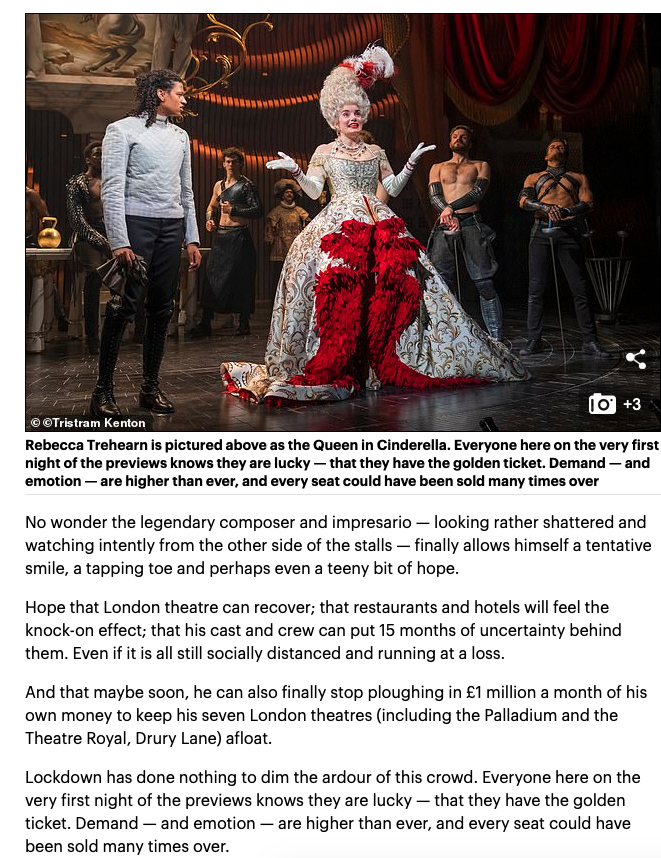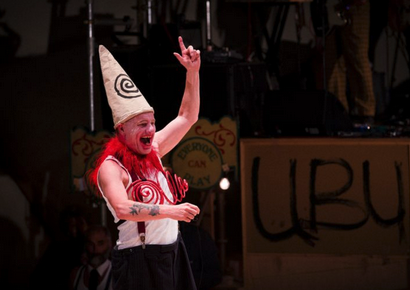Harry Potter shrinks from a double bill to one play only in North America
When Harry Potter and the Cursed Child returns to Broadway’s Lyric Theatre (pictured below) from November 16 (and then San Francisco from Jan 11 and Toronto in May 2022), it will be in a single play version, not the two parts that originally premiered as in the West End (and will continue as such when it resumes there from October 14, as well as in productions currently running in Melbourne and due to resume in Hamburg from December 1).

In a press statement, lead co-producers Sonia Friedman and Colin Callender have commented,
“Given the challenges of remounting and running a two-part show in the US on the scale of Harry Potter and the Cursed Child, and the commercial challenges faced by the theatre and tourism industries emerging from the global shutdowns, we are excited to be able to move forward with a new version of the play that allows audiences to enjoy the complete Cursed Child adventure in one sitting eight times a week.”
They went on to say:
“Though the global shutdowns were awful and devastating on so many levels, they afforded us, as theatre-makers, the rare opportunity to reunite with our award-winning creative team who fully embraced the challenge of creating a new single part version of the play that would be a compelling theatrical experience in its own right and stand shoulder to shoulder with the original two-part version. It’s been the most wonderful process of rediscovery to bring this new spectacle to life while still delivering all the amazing magic, illusions, stagecraft, and storytelling set around the same powerful narrative, that has enthralled audiences and critics alike.”
Truth to tell, the show was ‘softening’ at the Broadway box office pre-pandemic, so this has been an opportunity to create a more commercially viable version that doesn’t require audiences to make double the financial and time commitment of seeing two shows back-to-back to get the full experience.
At least audiences will effectively get a price reduction in seeing the new revised version; unlike audiences at the West End’s The Phantom of the Opera, which comes back with the orchestra cut from 27 players to just 14, but with prices at the old levels. The only people saving money there are the producers.
A full page puff piece for Andrew Lloyd Webber’s Cinderella in the Daily Mail
I wrote here last week about how the Daily Telegraph couldn’t help itself in reviewing Ian McKellen’s first performance as Hamlet; now the Daily Mail couldn’t resist giving Andrew Lloyd Webber’s Cinderella a full-page splash to welcome its first performance at the Gillian Lynne Theatre last Friday.
But the difference is that the Telegraph story was written by its chief theatre critic; the Mail is just a full-on gush fest from reporter Jane Fryer.


With news coverage like this, Lloyd Webber might be better off keeping the critics away…..
Companies surviving their original founders (or not)…..
Why should theatre companies exist in seeming perpetuity?
The National Theatre, of course, has long outlived its founder Laurence Olivier, just as the RSC has done for Sir Peter Hall. These companies have managed to have a global reach, and become institutions in their own right, with permanent buildings in London and Stratford-upon-Avon respectively to call home.
But other theatre companies are founded on an idea — a passion of their original creators, like Mike Alfreds when he founded the influential Shared Experience, Deborah Warner with her original Shakespearean Kick Theatre, Edward Hall his all-male Propeller Shakespeare touring company,
Sometimes a name change will signify a change of artistic directorship; Cambridge Theatre Company became Method and Madness, Oxford Stage Company became Headlong, the Tricycle became Kiln.
But sometimes, it is right and proper that the company simply ceases to exist after the original creators depart, as in the recent decision of the board of Cornwall’s Knee-high to disband the company after Mike Shepherd’s recent departure as its founding artistic director (pictured below).

As he stated when he left,
“For over 40 years, Kneehigh has been more than a job, more than a company and more than a vocation. Kneehigh has been my life’s work and, in turn, the story of my life. I have danced, sang, laughed and raged. I have run on the clifftops and travelled the world from Stenalees to Shanghai (and most places between and some beyond!).
I have led and I have followed as Kneehigh journeyed through different chapters; always riding the changes that life brings with generosity. And I have always embraced change, understanding that it is the life blood of art. Of all the things that have been created, the strongest are the friendships that have been forged and it is these that are the most precious. Roots have grown so deep that nothing will change or shake them. This is the end of this glorious book, but not the end of the wonderful adventures and friendships that are to come and will spring up anew. Thank you to all the Kneehigh family. Onwards! With a glint in my eye and a spring in my step…”
Former co-artistic directors Carl Grose and Emma Rice and long-standing Kneehigh writer Anna Maria Murphy, who’ve all also moved onto other things (Rice now runs her own company Wise Children), wrote a letter to the company”s board, and its principal funder the Arts Council, to urge that it be shut down. More than 50 artists associated with the company also signed it:
“Without its creative leadership in place, we believe that Kneehigh’s chapter in history has come to an end. Despite this great sadness we want to celebrate our time together, the stories we’ve told, the songs we’ve sung, the relationships we’ve forged and the history we’ve made.
But we cannot do this while the organisation attempts to move forward without us. We watch with broken hearts from the harbour wall as our glorious company drifts further out to sea, a ghost ship without its crew. /Allow us to end our journey in true Kneehigh style and celebration; allow us to say goodbye together, with pride and dignity; allow us to make joyful memories of our time together, not leave us with tainted ones.
We now ask as a group. As a band. As a family and a true ensemble. With your help and support, let’s make the Random Acts of Art project an act of closure and celebration for all of us. And then, we ask that you bring Kneehigh to a close, and allow us to grieve, toast, wail and riot at the glories we have been a part of.”
And that’s exactly what has now happened. In a statement, the company declared:
“Recent changes in artistic leadership raised questions as to whether Kneehigh could sustain their vision going forward. The Trustees and company reflected on a possible new future but concluded that it was better and more responsible to close Kneehigh and ensure an orderly wind down.”
ATG hold onto transaction fees even when they cancel the booking…..
ATG are shameless in maximising their revenues for their venture capital owners: a friend told me that when the transfer of the 2018 Broadway revival of Sunday in the Park with George with Jake Gyllenhaal, planned for the Savoy last year, was postponed, his tickets were refunded minus “the per transaction booking fee”. This is even though it wasn’t HIS choice to cancel. The theatre did!
According to ATG’s website,

Why on earth should the customer CARE about what revenues ATG can collect to provide essential services like seat selling? You can’t run a theatre without providing ticketing services! It’s like Sainsbury’s charging a premium to use their self-service check-outs. Especially when, as here, they are selling tickets for their OWN show! So it is not the only revenue they will generate from it. But if they are unable to deliver the show that the customer has actually booked for within a reasonable time of the booking being made, they need to refund the ENTIRETY of the booking.
